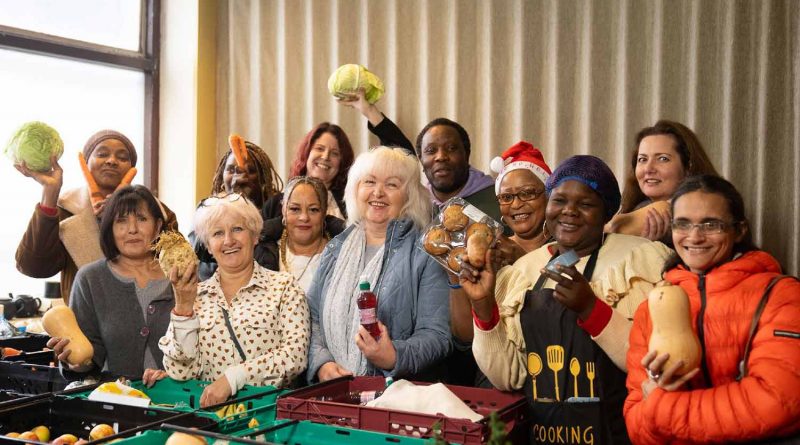Idia’s Community Kitchen is a lifeline for the homeless in Haggerston
Idia’s Kitchen in Fellows Court Community Centre is providing a vital lifeline for the homeless and hungry in Haggerston, writes citizen journalist Jamie Rae.
Whilst wandering through Haggerston’s cobbled streets and flower markets, you’d be lucky to take a turn and find yourself at Fellow’s Court Community Centre.
Here, in the absence of boastful displays, volunteers pull together to provide a variety of services for those struggling more than most. Food distribution, community events and a youth empowerment programme (which recently saw ‘Top Boy’ superstar Ashley Walters), all contribute towards a holistic approach to combat the increasing poverty in the area.
However, like all worthy success stories, the journey here wasn’t without trial and tribulation. After losing her job teaching catering at Hackney College, the founder of the charity Aina Omo-Bare began focusing her efforts on feeding the community. This was with the help of her family who have now been doing so for over 25 years.
Her daughter, Idia, was especially taken by the work. Often engaging in extensive conversations with those she was assisting, she was so dedicated that she even gave away her lunch on her way to school. However, whilst visiting her grandmother in Nigeria, Idia contracted typhoid fever which sadly led to her passing at age 11. Aina set up the charity in Idia’s memory; through which her daughter continues to help some of the most disadvantaged people in the community.
Since becoming a registered charity just over three years ago, the role of the charity within the community has seen significant growth. Beginning with a single ‘food drop’ once a week at the local church St Monicas, the charity now has a permanent base at Fellows Court.
Open seven days a week, a steady stream of people come into the centre – amounting to roughly 60 visitors per day. Many of them choose to take a seat for what can be a few hours, chatting amongst themselves, helping volunteers with small jobs, or opting for a more solitary experience, perhaps tapping a foot to the radio.
When asked about his experience of the community kitchen, Terry, a regular, said:
‘When I came I got made welcome. It is a nice relief that if, sometimes, you haven’t got the funds, or you’re having a bit of struggle and you need a bit of help, this is the place to come down to. They’ll always treat you nicely with cups of tea available. I mean, if this wasn’t here, I’d be walking miles just to try and get somewhere nice and warmed up.
‘I don’t go hungry now but there’s been days that I’ve sat with an empty stomach. But for me, coming down here, you go home with a nice belly full, or you get bits in your bag.’
Organised by volunteers, Idia’s Community Kitchen recently hosted its first annual Christmas party, which saw a hall filled with people from the community, each enjoying a spread of a variety of cuisines, tonics with medicinal benefits, and a popular karaoke machine rarely without occupation.
It is in these moments of celebration that we acknowledge the extent to which effective community organisations benefit people. Value that is difficult to quantify but held within the experience of the community itself.
The continuation of the community kitchen is dependent on a dedicated team of volunteers who help in their own ways. Food that would otherwise be wasted is collected by volunteers from supermarkets, restaurants and bakeries, then handed out, or cooked by qualified chefs who spend significant portions of their week cooking without pay.
At the end of each week, what is still fresh is cooked and taken to Dalston Market which sees roughly 200 queue to collect their free meal. Through this process, the community kitchen goes beyond social welfare, but also functions as an economic and environmental solution to corporate waste.
Many volunteers come and go as they please without schedule – something symbolic of the spirit of the organisation as a place where people just want to be – but also representative of a deeper part of human nature that gains from helping others. One volunteer, a woman known in the community as ‘Bonjour’, said: ‘I feel good because I participate in community wellbeing; I feel good because of the people I have met.’
Here, we see the impact of projects like Idia’s Community Kitchen. Not only do the volunteers provide a supportive blanket in the cost of living crisis, but they also restitch the social fabric of our communities.
Our capital city is often defined as a place where people lack compassion and time for others; a place that trades courtesy for productivity. Yet, within East London, many choose to go against the tide.
If you liked this article, you might enjoy Recipes of Life: a diasporic cookbook celebrating the spiritual sustenance of community.

